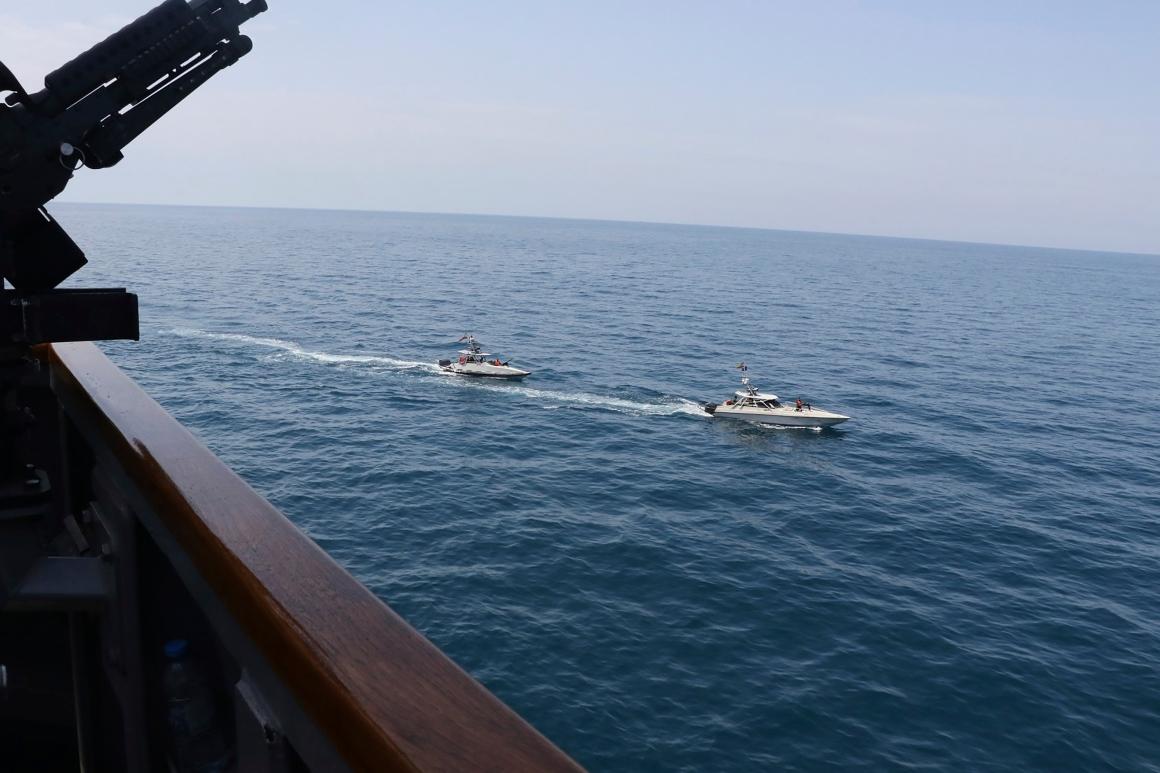
www.yahoo.com
Iranian ships once believed to be headed toward Venezuela change course, U.S. officials say
People familiar with the matter believe diplomatic efforts may have made a difference.
International
The Iranian navy ships believed to be originally headed toward Venezuela changed course early this week and are now steaming north up the west coast of Africa, U.S. officials said.
The ships, which U.S. officials believe may have been preparing to conduct an arms transfer, have appeared to change course several times during their journey from Iran — and could do so again. But after the course change early this week, they are likely now headed either into the Mediterranean — potentially planning to sail off of Syria — or north toward Russia, according to a defense official briefed on the situation, who spoke on condition of anonymity to discuss a sensitive subject.
U.S. officials believe the course change indicates that a diplomatic campaign to urge governments in the Western Hemisphere to turn away the ships was successful, the official said. The Iranian frigate Sahand and afloat staging base Makran charted a new course after Biden administration officials publicly and privately urged the governments of Venezuela, Cuba and other countries in the region not to allow them to dock, POLITICO reported.
Spokespeople for the White House, State Department and Pentagon did not immediately respond to requests for comment on Thursday.
But whether the ships cross the Atlantic, their journey is a significant demonstration of the naval capability of Iran, a longtime U.S. adversary that has sought to make inroads in Latin America. Last week marked the first time Iranian warships had rounded the Cape of Good Hope; none has ever successfully crossed the Atlantic or circled around the entire coast of Africa.
U.S. officials began closely monitoring the ships’ progress in mid-May as they left the Gulf and headed down the east coast of Africa. Officials believe they are carrying fast-attack boats and potentially other weapons to fulfill a deal that Iran and Venezuela inked a year ago; satellite images from May 10 show seven such vessels on the Makran’s deck.
Former officials from across the political spectrum urged the Biden administration to seize the ships if they attempted to carry out the transfer.
“They are in effect pirate ships,” said John Bolton, former national security adviser to President Donald Trump, noting that Iran has been designated a state sponsor of terrorism and Washington has levied heavy sanctions on Tehran and Caracas. “The United States has a legitimate right of self-defense against both of them.”
Retired Adm. James Stavridis, the former commander of U.S. European Command and U.S. Southern Command who was considered a possible running mate to Hillary Clinton during the 2016 presidential campaign, wrote that “intervention may be justified” because arms transfers are a potential violation of U.S. sanctions.
“If the U.S. was willing to seize Iranian oil shipments for violating sanctions last year, it should be prepared to take direct action to stop these small but lethal machines of war from being delivered to a corrupt and dangerous regime in Caracas,” he wrote in a Bloomberg op-ed last week.
The website TankerTrackers.com on Monday said it had assessed that the ships are now headed to Syria to participate in naval exercises with Russia. The site estimated the ships will pass Gibraltar on July 4, which is the two-year anniversary of the seizure of the Grace 1 supertanker as it sailed toward Syria.
This is not the first time Iran has been suspected of attempting to send arms to Venezuela. Last summer, Trump administration officials suspected that Venezuela was considering purchasing missiles from Iran, including long-range ones that could reach the United States.
Officials grew so concerned that they discussed options to seize the cargo, including sending Coast Guard cutters to intercept and board Iranian commercial ships that could be carrying weapons, according to two former defense officials with direct knowledge of the discussions. Aides engaged in lengthy discussions about justification, concluding that the administration could use Article II of the Constitution, which gives the president authority to defend against a threat to the homeland, one of the former officials said.
However, the key difference is that last year the discussions involved Iranian commercial vessels, while this year they involve warships. Coast Guard vessels may not be equipped to withstand a kinetic conflict with an Iranian warship, forcing U.S. officials to consider sending in U.S. Navy assets. However, the U.S. military has a limited naval presence in the Latin America region, typically deploying only a few smaller littoral combat ships at one time. The Pentagon would have to pull assets from other regions — a move the Navy is likely to resist.
Another challenge is that warships and other government ships are granted sovereign immunity in international waters by the United Nations Convention on the Law of the Sea, said Cornell Overfield, an associate research analyst at the Center for Naval Analysis. In this case, seizure of the vessels, even if they are found to be carrying arms, would be unlawful, he said.
“So long as the Iranian warships do not threaten use of force, sovereign immunity protects them wherever they are,” Overfield wrote in Foreign Policy.
























































